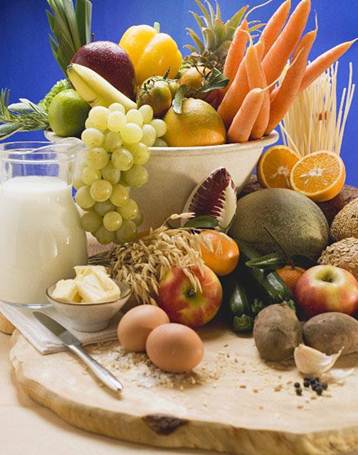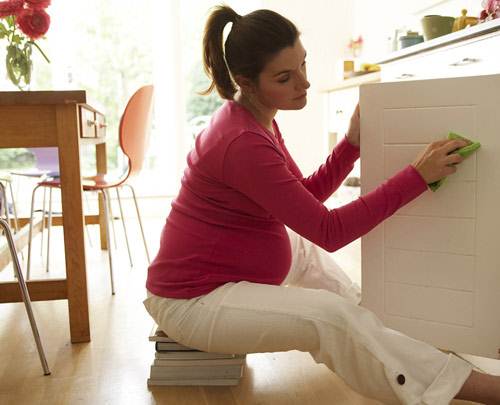Take the fat out of the fish or meat before cooking; at the
same time, remove the oily film on the surface of the food when
cooking.Besides, you can cut down the amount of fat in the food by grilling,
steaming, boiling or braising rather than frying them which you have to use
lots of oils. If you need to use oil, choose the type of oil that contains lots
of nutriments for both mother and baby such as olive oil, linseed oil,
sunflower oil... Replacing mayonnaise, sour cream in salad with sugar-free yoghurt
is also a good way to cut down the excess energy of the body. Use non-fat,
sugar-free milk and increase the amount of vegetable, as well as fruits in your
daily diet of both mom and baby.
Divide your meal in so small ones during the day
Right from the beginning of pregnancy, you should get used
to the habit of having 5-6 small meals in a day instead of having 2-3 main
meals. At the same time, you should ensure the equal nutrition demand within 24-48
hours rather than try to make the amount of essential nutrition equal in each
meal. To make sure that the daily used foods provide enough nutrition for you
and your baby, you can refer and apply the daily portion recommended as follow,
with each group of food representing a portion: 3 portions containing top protein
from animal meat, 2 portions of food containing vitamin C; 4 portions
containing calcium; 4-5 portions containing carbohydrate, complex sugars; 1-2 portions
of vegetables, fresh fruit, 2 iron-rich portion and 8 glasses of water, sugar-free
juice.

Divide your
portion into 5-6 small meals during the day help mother and baby absorb the
nutriments better, avoiding indigestion, heartburn, when being pregnant.
Choose healthy food containing lots of nutriments
Right when you start to get pregnant, you should master the
list of healthy, low-fat, low sugar and low energy but contain lots of
essential nutriments for both mom and baby. About vitamins, you should choose
orange-colored fruits, dark green leafy vegetables, milk, egg… to supplement vitamin
A which is necessary for the development of the cells, prevents problems
related to eyes, skin and push the immune system; dairy products, red meat,
poultry meat, fish, nuts, beans, banana… to provide vitamin B12, B6 which
support the development of blood cells, the functions of the neurons, and the
bran activities for the baby. Meanwhile, vitamin C can be found a lot in
fruits, vegetables such as broccoli, spinach… which helps to push up healthy
brain function, form bones, teeth, gum and blood vessel, and at the same time,
increase the absorption of iron and calcium for the body and collagen. The
yolk, fish oil and milk provide a rich source of vitamin D, which helps to
strengthen the bones, vitamin E in whole-grain cereal, vegetable oil, seeds,and
green leafy vegetables help to prevent damage in fetal cell…

You should choose
orange-colored fruits, dark green leafy vegetables, milk, egg… to supplement
vitamin A
At the same time, you need to diversify your diet with dairy
products, ark green leafy vegetables, soy bean and products from soy bean,
potatoes, nuts such as linseed, walnuts, sunflower seed cashew nuts, almond,
fishes, low-fat pork, poultry and beef, seafood… to supplement calcium for the
development of the baby’s skeletal system, folic acid to develop the nervous
system and avoid defects in fetus, iron to make blood and increase the amount
of oxygen in blood; magnesium to make the bones solid and ensure the muscle
activities and nerve function…

It’s good to
constantly care about your weight and do exercise regularly to burn off excess
energy after eating.
Make sure that you gain weight gradually: doctors recommend
that women having average weight when getting pregnant can gain from 10-15 kg within
the 40 weeks of pregnancy. According to that, normally, in the first 3 months,
you should gain 0.3-1 kg, 5kg in the next 3 months and 6 kg in the last 3
months. If you’re overweight before you get pregnant, you should gain about 7-11
kg, and if you’re pregnant with twins you need to gain 16-20 kg.
Consume unnecessary energy after eating: women should know
that the energy need in different stages of pregnancy is not the same.
Specifically, at the first 3 months pregnant women just need to supplement
about 300 calories each day, the next 3 months is 350 calories,and the last 3
months is about 500 calories. Therefore, if you realize that the total amount
of energy supplemented for the baby and mother exceeds this number, pregnant
women can do exercise to burn off excess energy by doing housework, and have
more physical activities such as walking, practicing yoga, exercising…